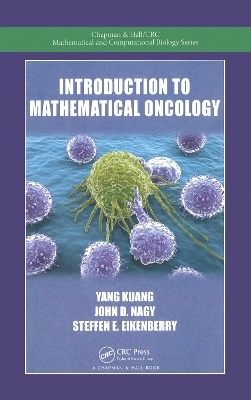
Introduction to Mathematical Oncology
Chapman & Hall/CRC (Verlag)
978-0-367-78315-0 (ISBN)
Introduction to Mathematical Oncology presents biologically well-motivated and mathematically tractable models that facilitate both a deep understanding of cancer biology and better cancer treatment designs. It covers the medical and biological background of the diseases, modeling issues, and existing methods and their limitations. The authors introduce mathematical and programming tools, along with analytical and numerical studies of the models. They also develop new mathematical tools and look to future improvements on dynamical models.
After introducing the general theory of medicine and exploring how mathematics can be essential in its understanding, the text describes well-known, practical, and insightful mathematical models of avascular tumor growth and mathematically tractable treatment models based on ordinary differential equations. It continues the topic of avascular tumor growth in the context of partial differential equation models by incorporating the spatial structure and physiological structure, such as cell size. The book then focuses on the recent active multi-scale modeling efforts on prostate cancer growth and treatment dynamics. It also examines more mechanistically formulated models, including cell quota-based population growth models, with applications to real tumors and validation using clinical data. The remainder of the text presents abundant additional historical, biological, and medical background materials for advanced and specific treatment modeling efforts.
Extensively classroom-tested in undergraduate and graduate courses, this self-contained book allows instructors to emphasize specific topics relevant to clinical cancer biology and treatment. It can be used in a variety of ways, including a single-semester undergraduate course, a more ambitious graduate course, or a full-year sequence on mathematical oncology.
Yang Kuang is a professor of mathematics at Arizona State University (ASU). Dr. Kuang is the author or editor of more than 150 refereed journal publications and 11 books and the founder and editor of Mathematical Biosciences and Engineering. He is well known for his pioneering work in applying delay differential equation to models of biology and medicine. His recent research interests focus on the formulation of scientifically well-grounded and computationally tractable mathematical models to describe the rich and intriguing dynamics of various within-host diseases and their treatments. These models have the potential to speed up much-needed personalized medicine development. He earned a Ph.D in mathematics from the University of Alberta. John D. Nagy is a professor of biology and former chair of the Department of Life Sciences at Scottsdale Community College (SCC). He is also an adjunct professor in the School of Mathematical and Statistical Sciences at ASU. He is the founding director of an undergraduate research program in mathematical biology at both ASU and SCC. Dr. Nagy’s primary research interests focus on the evolutionary dynamics of disease, including the application of mathematics and principles of evolutionary ecology to cancer and disease biology. He pioneered the "hypertumor" hypothesis and recently addressed how evolution shapes malignant characteristics of cancer. He earned a Ph.D. in mathematical biology from ASU. Steffen E. Eikenberry is completing his M.D. at the University of Southern California (USC), as the final component of a combined M.D./Ph.D. program. He earned a Ph.D. in biomedical engineering from USC, with his dissertation studies focused on hierarchical model building for immune–pathogen interaction. Dr. Eikenberry is particularly interested in a careful approach to mathematical model building, understanding how specific functional forms affect model dynamics, and using modeling to address well-defined clinical questions, especially those pertaining to cancer treatment and screening. These well-formulated mathematical models can potentially form a conceptual foundation that informs clinical research and practice in the future.
Introduction to Theory in Medicine. Introduction to Cancer Modeling. Spatially Structured Tumor Growth. Physiologically Structured Tumor Growth. Prostate Cancer: PSA, AR, and ADT Dynamics. Resource Competition and Cell Quota in Cancer Models. Natural History of Clinical Cancer. Evolutionary Ecology of Cancer. Models of Chemotherapy. Major Anti-Cancer Chemotherapies. Radiation Therapy. Chemical Kinetics. Epilogue: Toward a Quantitative Theory of Oncology.
| Erscheinungsdatum | 06.04.2021 |
|---|---|
| Reihe/Serie | Chapman & Hall/CRC Mathematical Biology Series |
| Sprache | englisch |
| Maße | 156 x 234 mm |
| Gewicht | 453 g |
| Themenwelt | Mathematik / Informatik ► Mathematik ► Angewandte Mathematik |
| Medizin / Pharmazie ► Allgemeines / Lexika | |
| Studium ► Querschnittsbereiche ► Epidemiologie / Med. Biometrie | |
| Naturwissenschaften ► Biologie | |
| ISBN-10 | 0-367-78315-0 / 0367783150 |
| ISBN-13 | 978-0-367-78315-0 / 9780367783150 |
| Zustand | Neuware |
| Informationen gemäß Produktsicherheitsverordnung (GPSR) | |
| Haben Sie eine Frage zum Produkt? |
aus dem Bereich


